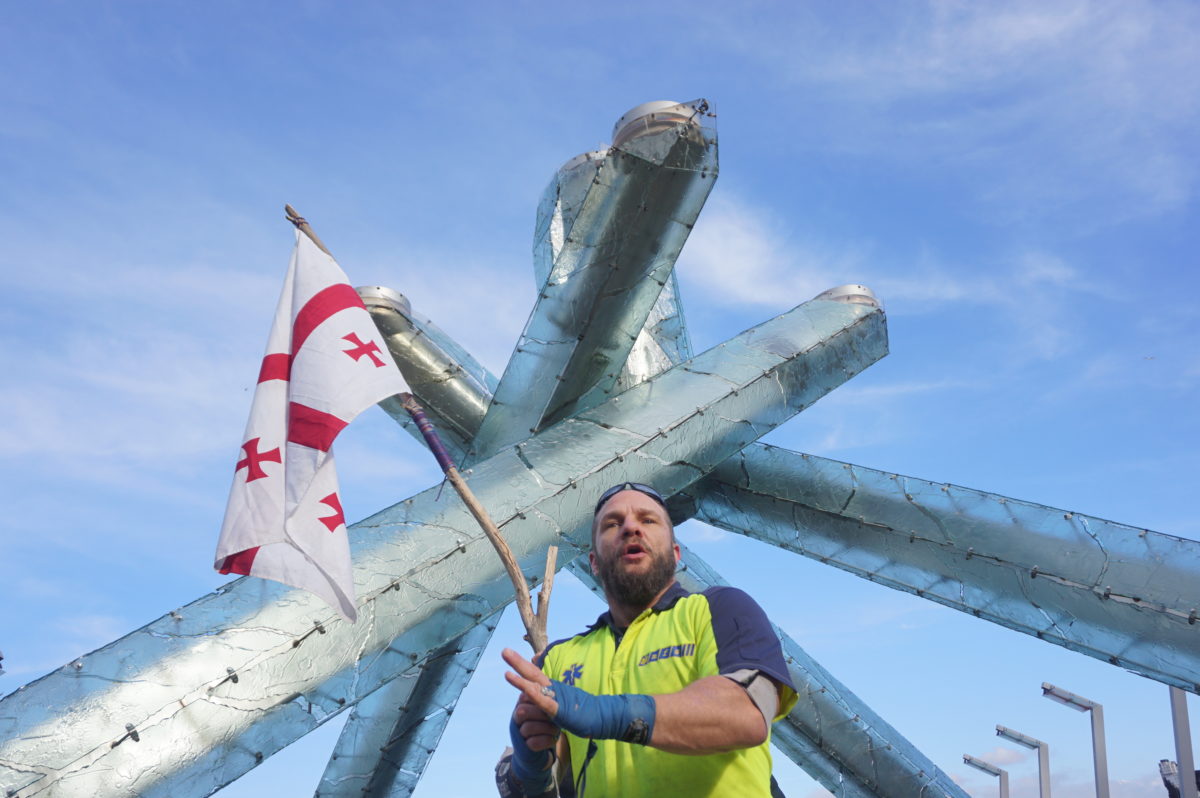
Terrance Kosikar was a medic who treated luger Nodar Kumaritashvili on the opening day of the Vancouver 2010 Winter Olympics at the Whistler Sliding Centre. The Georgian died later of his injuries, casting a pall over the Games. Kosikar suffered Post-Traumatic Stress Disorder, but now campaigns for awareness and solutions. On Feb. 13, he will lead a quest to flip a 200-kilogram tire up Blackcomb Mountain to aid Camp My Way, the wilderness program he founded to help first responders overcome PTSD. theBreaker spoke with Kosikar about his struggles. This is the second of two parts. Read part one here.
Bob Mackin
Almost three months after he lost his job at the Whistler Sliding Centre, Terrance Kosikar wrote a desperate email in late March 2012 to John Furlong.
Track medic Kosikar told Furlong that the aftermath of Nodar Kumaritashvili’s death on the opening day of the Vancouver 2010 Winter Olympics plunged him into depression, Post-Traumatic Stress Disorder and painkiller addiction. He said his family was on the verge of homelessness.
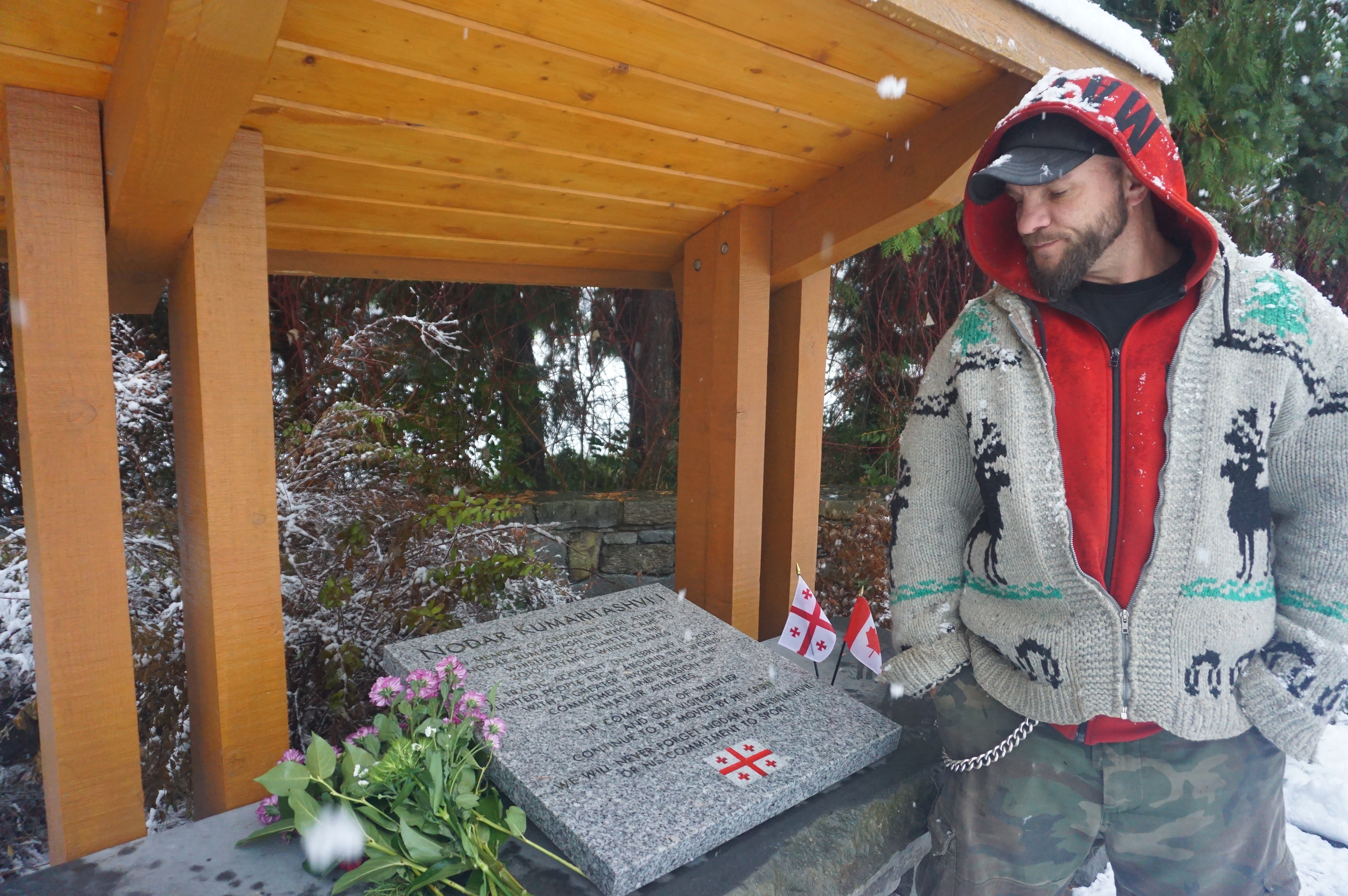
Kosikar at the Whistler Olympic Plaza monument to Kumaritashvili (Mackin)
Furlong was no longer the chief executive for the 2010 Games organizing committee, known as VANOC. He finished his job and joined several corporate boards, but remained involved with Canada’s Olympic scene as chair of Own The Podium, the federal funding agency connected to the Canadian Olympic Committee. Furlong had been under fire a year earlier when CBC’s Fifth Estate investigated the Feb. 12, 2010 tragedy. CBC revealed Furlong was worried, almost a year before the Games, about safety on the $119 million bobsled, luge and skeleton track. Architect Udo Gurgel had complained that athletes were sliding faster than his design calculations.
“An athlete gets badly injured or worse and I think the case could be made we were warned and did nothing,” Furlong wrote in a March 2009 email to VANOC executives.
Kosikar wrote in his email that he had unsuccessfully warned the venue’s general manager, Craig Lehto, in 2009 about the roofing supported by posts that were erected beside the track before the Games. Kumaritashvili died in the Whistler athletes’ village polyclinic after he was catapulted from his sled and struck one of those posts at 136 km-h in a training session.
“I just want my life and health back …(and food back in the fridge),” Kosikar wrote to Furlong. “Please help, I remember we met when I asked you to have those black ribbons made. You smiled and told me if there was anything I ever needed contact you… well… I’m now contacting you. I had the red mohawk with the Canadian leaf shaved in my head…(if that rings a bell).”
Read Terrance Kosikar’s correspondence from Terry Wright of VANOC. Click here.
Instead of a reply from Furlong, it was Terry Wright, the VANOC executive vice-president who remained involved in the wind-down of the organizing committee’s operations. Wright and VANOC lawyer Dorothy Byrne met with Kosikar in April 2012.
“Your candour and willingness to share some clearly painful observations about your past and the accident was admirable,” said Wright in a May 7, 2012 letter to Kosikar. “While the accident touched the lives of many, some have lived it much more profoundly and your close involvement with the track and Nodar makes you one of the closest, to be sure. This was undoubtedly a very difficult period in your life and these are not easy subjects to discuss at any time and particularly now given your circumstances.
“It occurs to us that your four years of dedicated experience at the track, both before and after the 2010 Games, could provide useful insights to the facility safety audit that is currently underway. We all want the final outcome of the tragedy on February 12th, 2010 to be the safest environment. We need your input and perspective to help ensure this outcome.
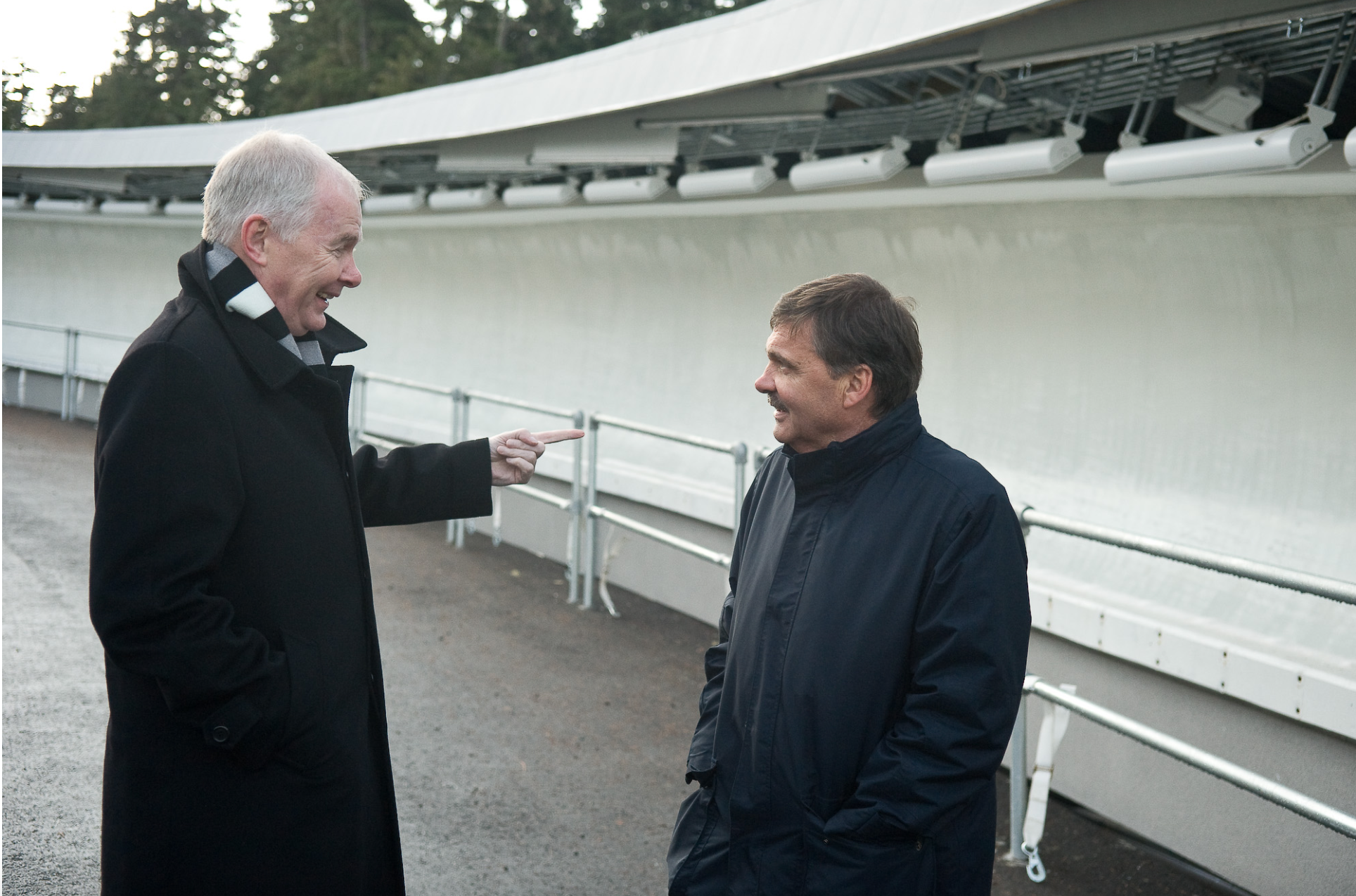
VANOC CEO John Furlong (left) and the IOC’s Rene Fasel during a pre-Games inspection of the Whistler Sliding Centre. (VANOC)
“I hope you will agree that a track that has been thoroughly audited for safety is perhaps the best legacy we can all leave from our experiences there. We respectfully ask you to please consider whether you could do this, recognizing that the audit is expected to be completed soon.”
Kosikar said Wright agreed to pay him $15,000 to be part of the safety audit team ordered by the Coroners Service of B.C. in the October 2010 report on the incident. Kosikar said he could have asked for more money, but he wanted to help make the sliding centre safe, so there would never be a repeat of Feb. 12, 2010. He was expecting VANOC to send him to Calgary on a regular basis to work on the project, but was involved in only one conference call in late May 2012.
Wright declined to comment for this story.
After the Games, VANOC raised $25,000 from the auction of a Games podium to give the Kumaritashvili family until the $150,000 payout from the VANOC insurance policy. The crash was ruled an accident. There were no lawsuits or criminal charges. The coroner did not schedule an inquest hearing.
In April 2012, Kosikar’s life had taken another turn for the worse. His claim for worker’s compensation was denied.
Kosikar had waited until just before Christmas 2011, nearly two years after the crash, to file with WorkSafeBC. The April 2012 denial letter said he told a case manager that he did not apply within the one-year window because he feared it would be detrimental to his career as a firefighter, ski patroller and medic. He filed the application four days after he was on paid suspension pending termination, after learning that a co-worker who was also on-scene Feb. 12, 2010 had successfully qualified for PTSD compensation.

VANOC’s Wright.
The WorkSafeBC denial letter said that statements from two unnamed co-workers indicated Kosikar did not complain of having trouble coping with the aftermath. One of them said that the application was a direct result of being suspended from work, being short of cash and learning that a co-worker had received WorkSafeBC benefits.
The denial letter said Whistler Sport Legacies Society, the post-Olympics operator of the Whistler Sliding Centre, suspended Kosikar Dec. 18, 2011 for calling in late and sick due to drug withdrawal, being difficult to work with and making threats to co-workers.
WorkSafeBC found no special circumstances that precluded Kosikar from claiming psychological injuries sooner. “Rather, you made a conscious choice based on your belief that it was not in your best interest to claim at the time,” said the letter.
The board made the decision to extend Kosikar’s clinical counselling sessions with Dr. MacDonald “as a measure of support for you separate now from the individual claim.”
In a reply letter, Kosikar said not all of his superiors had been interviewed, including general manager Tracy Seitz.
Read Terrance Kosikar’s correspondence with WorkSafeBC. Click here.
“It was not until my boss [Seitz] advised me to get the help and I may have it, that I was aware it was an injury and I could file for it,” Kosikar wrote in reply. “I was only a volunteer fireman and ski patroller and we don’t sit around all day talking about injuries and conditions.”
Kosikar told theBreaker that he had been warned by a VANOC official immediately after Kumaritashvili’s death not to speak of the crash to anyone.
Seitz, who succeeded Lehto as the venue’s general manager, did not respond for comment. Whistler Sport Legacies’ spokeswoman Silke Jeltsch refused to arrange an interview, because theBreaker was inquiring about a “personnel matter.”
Kosikar appealed for more help from VANOC, to either intervene with WorkSafeBC or help him otherwise financially.
VANOC lawyer Gabriel Somjen of Borden Ladner Gervais turned down his request to fund a book about his ordeal in a June 20, 2014 letter. VANOC was prepared “on a without prejudice basis and without any admission of liability” to engage Back in Motion, a third-party WorkSafeBC contractor, to provide him with a counselling and retraining program. The counselling would be in Vancouver, vocational training in Squamish or Whistler.
“This gratuitous offer does not in any way preclude you from taking whatever steps you may with to take in terms of disclosing your concerns publicly, nor is VANOC asking for any form of release,” Somjen wrote.
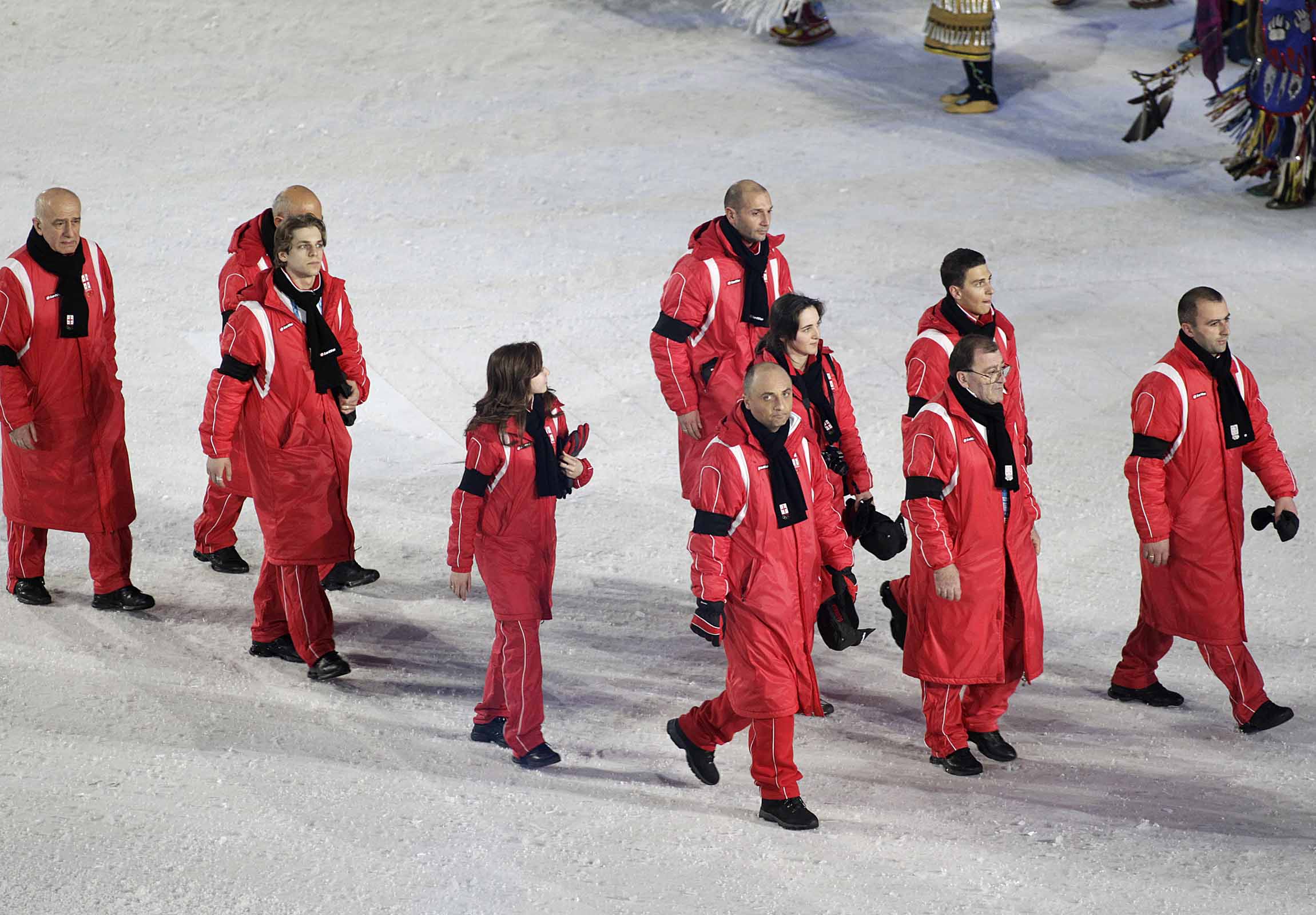
Georgia’s Olympic team at the Vancouver 2010 opening ceremony, hours after Nodar Kumaritashvili’s death. (Brian Howell)
Kosikar responded the next week, that, despite the safety audit “I insist that the protocols and standards that I suggested at that meeting are still not wholly implemented to ensure future safety. WCB were aware that certain workers received support and others did not. Being the actual first responder and having my claim denied impacted me deeply.
“As evident from all of my communications, my aim is to be a positive contributor to the community and get back to work and life as normal.”
Kosikar accepted the VANOC offer, but it was a catch 22. Without further VANOC funding, he was unable to afford accommodation in Vancouver, so he did not attend the counselling sessions.
It was the middle of a difficult year that would only get worse for Kosikar. He was on the mend from breaking his pelvis while performing at women’s night in a Whistler bar. He feared he would never walk again. By the end of the year, he had relapsed and was living on the streets of the Downtown Eastside. He said he robbed a heroin dealer, drove the Stanley Park Causeway to get away and stopped suddenly on the Lions Gate Bridge. There, he impulsively decided that he wanted to jump to his death. With the vehicle running, he leaped over the sidewalk barrier, but had second thoughts when he noticed the distance to the water. He carried on for the long drive to his cabin in Seton Portage, near Lillooet
Read Terrance Kosikar’s correspondence with a VANOC lawyer. Click here.
“I don’t remember getting to my cabin. I remember waking up in my cabin, shaking, shivering, smelling of death,” he said.
He could no longer look at people, because he could no longer stand himself. So he learned to survive in the wilderness around his cabin. It was all he had.
“That’s where I found myself.”
He also found a 200-kilogram tractor tire.
“I wanted to get strong, start exercising. I wanted to show all the people who put a knife in my back and a foot in my ass, I wanted to show them that who I really am, what I’m capable of. I just needed a little bit of help.”
So he meditated, hugged trees, watched deer and listened to songbirds. Looking back, Kosikar said that he cannot be ashamed of his past mistakes, but must take responsibility, accountability and seek forgiveness.
“I never felt better in my entire life, totally drug free, totally natural, no cell phones, no doctors, no psychologists, I had to do it myself,” he said. “I was dreaming again, I was sleeping again. I couldn’t be more excited than to wake up the next morning and go get some more exercise, get out into the mountains, reconnect with myself and find a higher power.”
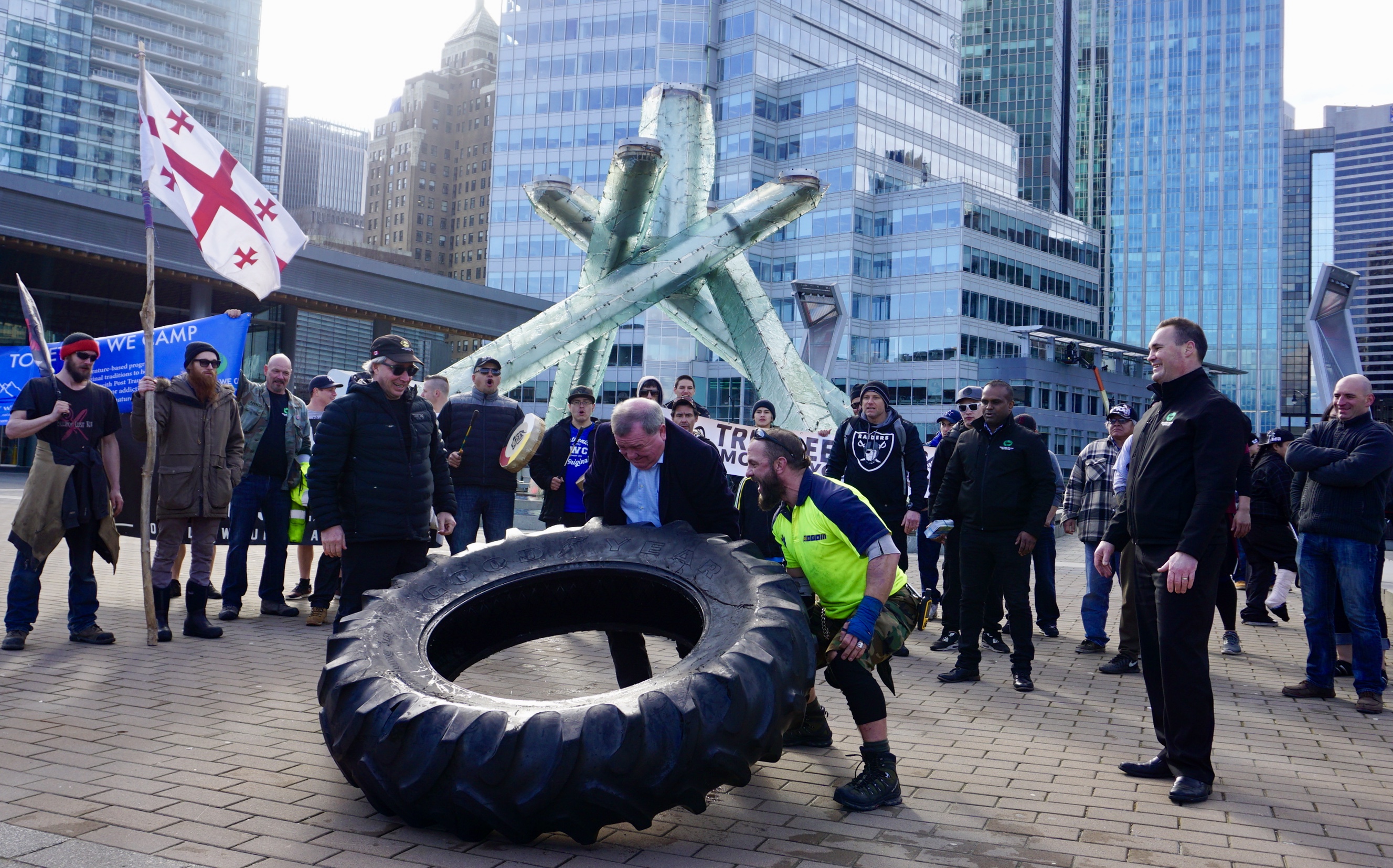
NDP cabinet minister Shane Simpson helps Terrance Kosikar flip a tire by the Vancouver Olympic Cauldron on Feb. 10, 2018. (Mackin)
Stacy Wilson met Kosikar in 2012, when he was “in a fairly dark place, in desperate need of treatment.” Kosikar’s loved ones reached out to Wilson’s Together We Can Addiction Recovery and Education Society for help.
Despite the PTSD and addiction and a relapse in 2014, executive director Wilson said, Kosikar maintained a unique sense of charisma and determination.
“He automatically makes an impact. The nature of his bottom back in 2012 was fairly significant, so it’s professional experiences and personal experiences that led him down a very dark path,” Wilson said.
“When an individual is completely broken, the irony is they stand the greatest chance of success. He was very teachable when he did come into treatment. He absorbed a lot of information, his desire was there, he showed perseverance, he showed willingness. Unfortunately with the nature of addiction it’s not always a linear path to success.”
Wilson estimated that 70% of Together We Can’s clientele has suffered from PTSD of varying degrees, including first responders and military veterans who served multiple tours of duty. For some of them, PTSD “is so debilitating, that you’d be aghast,” Wilson said.
Mental health issues were not as understood or as publicized in the mainstream in 2010 when Kosikar’s PTSD was triggered. Wilson is “cautiously optimistic” with the culture shift.
“There is a lot more awareness out there, but there is a lot more work to be done to actually provide practical and tangible solutions for people to access,” he said. “We’re better than we were, but we’ve got a long way to go.”
It is a cold, sunny Saturday morning, two days before the eighth anniversary of the day Kumaritashvili lost his life and Kosikar began to lose control of his. Kosikar and his supporters from Together We Can, many of them in treatment for addiction and PTSD, gather beneath the Olympic cauldron at Jack Poole Plaza. Kosikar carries the flag of Georgia on a long tree branch, in memory of the 21-year-old luger he tried to save.
Kosikar is joined by Shane Simpson, the NDP’s Minister of Social Development and Poverty Reduction, in exercises, including a group chant of Kosikar’s motto: “It’s Not Weak to Speak.”
Simpson joins Kosikar for the first few flips of that 200 kg tire to launch a 24-hour marathon of strength around the Stanley Park Seawall to aid Camp My Way.
“Terrance has picked a pretty unique way to raise awareness around that and have people pay attention to this issue,” said Simpson, the NDP MLA for Vancouver Hastings.
Listen to Terrance Kosikar and Shane Simpson on theBreaker.news Podcast. Click here and go to the 10:30 mark.
“He’s done a remarkable job in raising awareness and helping inform the debate around this. He catches people’s attention because of what he does, but then he really articulates really well what the issue is. He built on that with the work he’s done with the camp.”
In March 2017, Simpson held the labour portfolio in the NDP shadow cabinet and tabled a private member’s bill to add a PTSD-related presumptive clause to the Workers’ Compensation Act. That would mean if a first responder suffered PTSD, it would be automatically deemed an occupational injury. Alberta and Manitoba have such a presumptive clause and Ontario and New Brunswick intend to follow.
If that presumptive clause had existed in 2010, Kosikar would have been eligible for help relatively quickly and he would have been on the road to recovery.
Kosikar: “I wanted to show… who I really am, what I’m capable of. I just needed a little bit of help.”
“This will end the hurdles around WorkSafeBC claims and the related unacceptable delays that too many of these public servants who need support are facing today,” Simpson told the Legislature. “First responders — including police officers, firefighters, paramedics, 9-1-1 dispatchers, sheriffs and corrections officers — suffer PTSD at more than double the rate of the general population.”
Simpson pointed to the unanimous adoption of a presumptive clause for firefighters who suffered work-related cancer, and suggested the BC Liberals do the same for first responders who suffer PTSD.
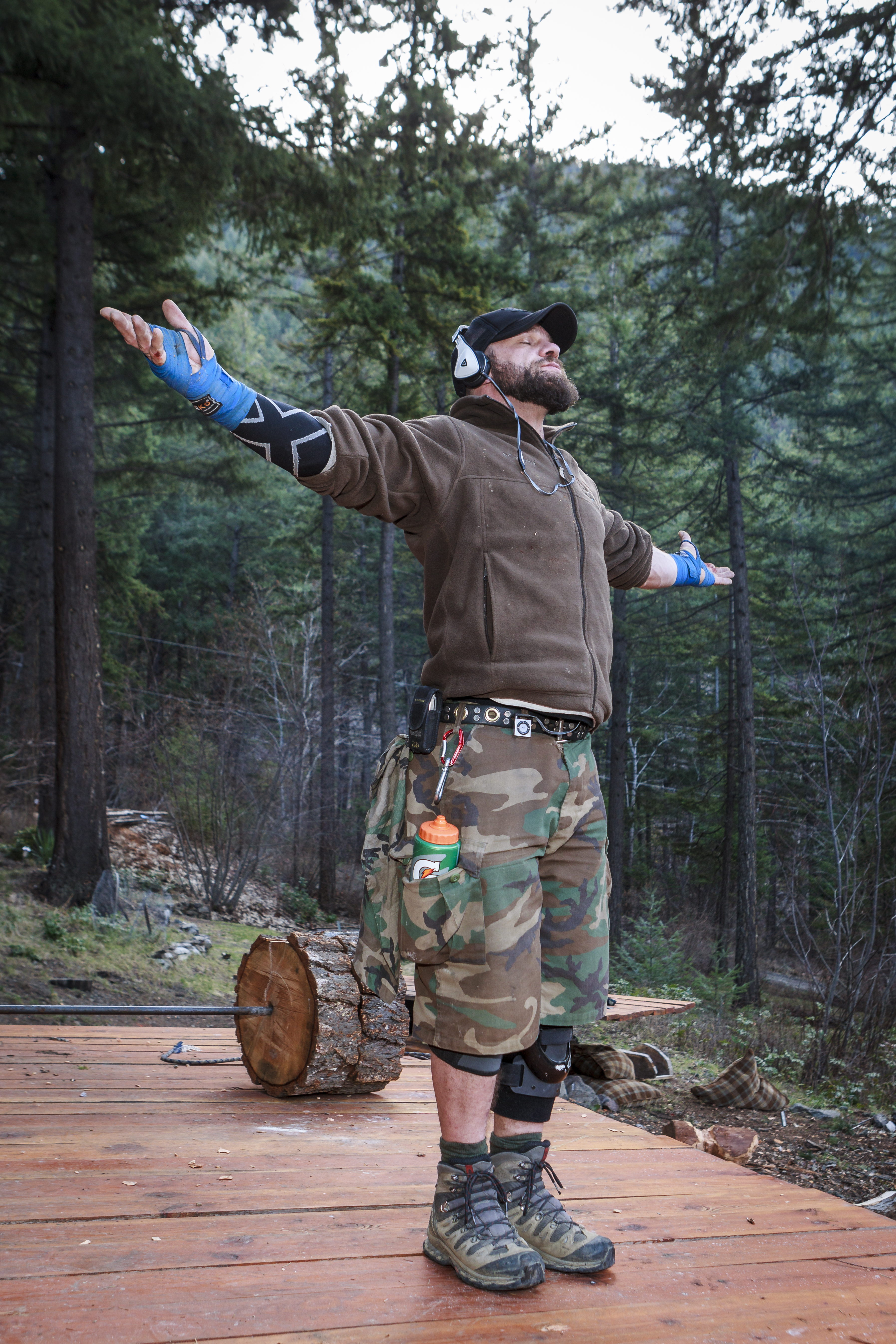
Kosikar meditating at his cabin near Lillooet, B.C. (Joern Rohde)
The bill did not pass, but the NDP came to power last July. Simpson told theBreaker that Labour Minister Harry Bains is preparing legislation.
“It’s a priority for our government, to deal with the question of PTSD and a presumptive clause for first responders, in particular,” Simpson said. “I’m very hopeful we’ll be able to take some meaningful action on that that this year.”
The Tema Conter Memorial Trust said it received reports of 56 suicides by public safety professionals across Canada in 2017 — 16 of the victims were paramedics and 16 were police officers. The death toll is less than the 68 in each of the previous two years, but more than the 48 reported in 2014. Already, in 2018, TEMA.ca says that two paramedics have taken their lives.
Rather than turning on a TV or clicking on a mobile phone app to watch the PyeongChang 2018 Winter Olympics, Kosikar will be on the slopes of Blackcomb Mountain on Feb. 13, rolling that tire in memory of Kumaritashvili and the first responders who lost their battle with PTSD.
This is no Sisyphean stunt. Kosikar’s long-term goal is to make the land around his Seton Portage cabin, called Camp My Way, a destination retreat where PTSD-affected first responders can get away from the sirens and get into the serenity. He’s joining a larger movement that wants to stop the stigma of PTSD and increase awareness of the warning signs, so that first responders can take a necessary, preventive time out before it’s too late.
Ultimately, the biggest problem wasn’t that Kosikar didn’t get immediate help on Feb. 12, 2010, he said. It was that he wasn’t given the know-how before he started the job. “Why didn’t WorkSafeBC or any of the British Columbia Justice Institute training with fire-rescue or ski patrol — why wasn’t self-care, self-awareness [taught]?” Kosikar asked. “Why is there not a chapter on post-traumatic stress disorder?
“I want to make it clear, this a wrong diagnosis to be calling post-traumatic stress a disorder. Because it’s not a disorder. It’s an injury.”
Anyone feeling distress can call 9-1-1, the 24-hour crisis line (1-800-SUICIDE in Canada; 1-800-273-TALK in the United States) or visit a hospital emergency room near you. People are ready to help.
Support theBreaker.news for as low as $2 a month on Patreon. Find out how. Click here.










